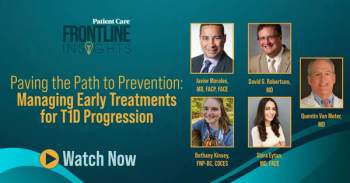
Panelists discuss the burden of living with type 1 diabetes, including high levels of stress and anxiety and talk about how they help patients manage the daily requirements.

Panelists discuss the burden of living with type 1 diabetes, including high levels of stress and anxiety and talk about how they help patients manage the daily requirements.

Panelists discuss early testing with autoantibody screening for type 1 diabetes in at-risk individuals, particularly those with family history or genetic predisposition, to avoid DKA at diagnosis and allow time for patient and family preparation.

Panelists discuss how type 1 diabetes progresses through distinct stages, beginning with asymptomatic autoantibody presence, followed by dysglycemia, and ultimately manifesting with classic symptoms like excessive thirst, frequent urination, and unexplained weight loss.

Panelists discuss how delayed intervention in stage II type 1 diabetes can accelerate β cell destruction, leading to more severe clinical onset, increased risk of serious complications like diabetic ketoacidosis, and poorer long-term outcomes.

Panelists discuss how islet autoantibody testing serves as a critical screening tool for identifying Type 1 diabetes risk, with tests detecting antibodies against insulin, GAD65, IA-2, and ZnT8 proteins being the most clinically validated markers.

Panelists discuss how teplizumab, the first FDA-approved disease-modifying therapy for Type 1 diabetes, can delay disease onset by targeting CD3+ T cells and preserving beta cell function in high-risk individuals.

Panelists discuss how patient selection for teplizumab therapy requires screening for specific autoantibodies and stages of Type 1 diabetes, followed by a standardized 14-day outpatient infusion protocol with careful monitoring for side effects.

Panelists discuss how early identification of Type 1 diabetes through screening programs, combined with emerging therapies like teplizumab, offers new opportunities for intervention and improved patient outcomes in at-risk populations.